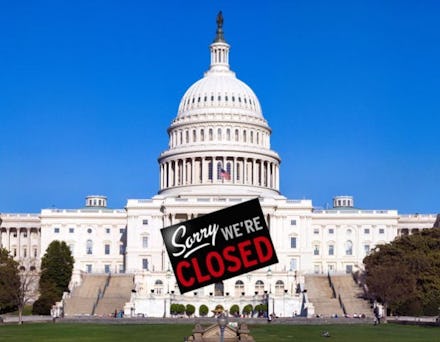3 Reasons the 2013 Government Shutdown is Nothing Like 1995

As our beloved representatives in Congress keep trying to make sure someone else gets blamed for the government shutdown, we're left to face the repercussions of their incompetence. But this isn't the first time we have had a controversy over the budget. Specifically, disagreements over provisions on Medicare, public health, education, and the environment caused the government shutdown of 1995. Indeed, there are parallels between that one and the current shutdown, but it remains to be seen which one overall will be more detrimental to the wellbeing of American democracy.
1. Politics Leading Up to the Shutdown
1995: The political shutdown in 1995 was comparable to the current one in that the budget dispute was at first over Medicare, public health, education, and the environment, but then quickly turned into a dispute over power. The newly elected House Republicans and their fearless leader, Speaker Newt Gingrich, wanted to encroach upon the power of President Bill Clinton.
The Republicans had proposed deep cuts in both Medicare and Medicaid, as well as other non-defense spending, which Clinton disagreed with for the upcoming 1996 fiscal-year budget. No real consensus on the budget was reached, and thus a continuing resolution funding the government expired on November 13, 1995, pushing the government into a shutdown until November 19, at which point President Clinton and Congress had tried to come to an agreement on a seven-year budget plan. Instead, another continuing resolution was passed to be active until December 15, when the government shutdown yet again, instead this time for 24 days until January 1996 when the president and Congress finally decided on a seven-year balanced budget plan with modest spending cuts and tax increases.
Verdict: In terms of policies leading up to the respective shutdowns, the motives behind the 2013 shutdown speak far worse about our politicians than those of 1995. In 1995 the shutdown seemed to be a dispute purely on the actual budget, and the notion of compromise wasn't a stranger to either party. However, in 2013 an entire political party was prepared to just allow the government to default in the hopes of removing a single piece of legislation that has some significance to the budget.
2. Economics, Then and Now
1995: The economy was relatively unaffected by the 1995 shutdown (in fact, stocks were recorded as increasing). Unemployment was at a relative low of 5.6%, and the total damage from both shutdowns in 1995 and 1996 led to a 1% reduction in the growth of GDP. We must realize at the same time, however, that government spending wasn't as crucial to our GDP 18 years ago as it is today, with 19% in 1995 compared to 22% in 2013.
2013: As of right now, 800,000 federal employees were furloughed as non-essential members of the federal workforce. At the current rate of two weeks since the government shut down, this would lead to a 0.3% drop in the national GDP when the numbers are looked at annually, or a whopping $300 million in national GDP per day. Relatively, at first this doesn't seem like much, but if the government is shut down for a greater period of time, the economic impact in the future gets worse.
Verdict: The government has legislation underway that would compensate some furloughed workers, but the problem with this is aptly expressed in an article by Neil Irwin: "The risk . . . is that a shutdown that imposes a smaller degree of economic harm in fewer Congressional constituencies could also be more politically tolerable and therefore last longer — becoming a chronic rather than acute problem for the economy. So it is possible that while the economic cost per week of shutdown is now lower, the ultimate economic cost might not be."
Even though we might see some sort of beneficial economic growth as a consequence of the shutdown, those effects will be ephemeral. The long-term repercussions still lie ahead regarding annualized GDP amounts lost.
3. The U.S. in the Global Context
1995: During the previous government shutdown, many of the economic and global factors that facilitate an international and national economy today didn't exist 18 years ago. Eighteen years ago the internet consumer base was just starting out, and Silicon Valley was booming. And some of the countries that we compete with as economic powers were just beginning to assert themselves into the world of global macroeconomics, namely China.
2013: As mentioned before, and witnessed in the graph, federal spending has seen a tremendous surge in our national GDP since 1995. In fact many nations are looking at America with concern. Douglas Carswell, a member of the British Parliament, states the the U.S. has been living far beyond its means, and that such inequity in funds is a surefire way to ensure that "something's going to give...and not in a philanthropic sort of way."
Chinese Vice Finance Minister Zhu Guangyao of China hopes that the U.S. settles its issues with the government shutdown by October 18 to ensure that the economy doesn't default and that the investments are secured.
While nations such as China naturally worry about their investments, nations such as Singapore cry out about "dented diplomacy." Nations are uneasy with the idea of a president who can't attend to his international duties because he's too busy dealing with domestic affairs every time there is gridlock in the economy.
Through all of this, the most morbid view of all comes from South Africa, which has forewarned the global community to "shore up its economic defenses accordingly."
Verdict:As the global community progresses into a more technologically advanced age, as the barriers between developing and developed nations continue to erode, and as smaller nations enter into the global network of economics as stable powers, we need to ensure that our country can compete at its best as well. Even though the United States is a superpower, it still has its own sort of kryptonite: unyielding partisanship.